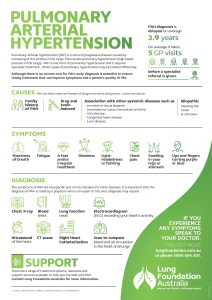The Pulmonary Arterial Hypertension infographic from Lung Foundation Australia provides a comprehensive and informative snapshot of the impact of the condition in Australia including key statistics, causes, symptoms and diagnosis.
Pulmonary Arterial Hypertension (PAH) is a rare, progressive condition that affects the arteries in the lungs, causing them to narrow and leading to high blood pressure in the lungs. Unlike other forms of pulmonary hypertension, pulmonary arterial hypertension requires specialist treatment, and early diagnosis and intervention to improve quality of life and manage symptoms effectively.
Causes of PAH are diverse and can affect individuals of all ages, genders, and ethnic backgrounds. Known causes include a family history of PAH, exposure to certain drugs and toxins, and associations with systemic diseases such as connective tissue disorders (e.g., scleroderma, lupus, rheumatoid arthritis), HIV infection, congenital heart disease, and liver disease. In many cases, the cause remains idiopathic, meaning it is unknown.
Symptoms of PAH are often nonspecific and can be mistaken for other conditions, contributing to delayed diagnosis and treatment. Common symptoms include shortness of breath, fatigue, chest pain, dizziness, light-headedness or fainting, a fast or irregular heartbeat, swelling in the legs or abdomen, and a bluish tint to the lips or fingers.
Diagnosis of PAH is complex and often delayed—on average, it takes 3.9 years and five general practitioner (GP) visits before a specialist referral is made. Diagnostic procedures may include chest X-rays, echocardiograms (ultrasound of the heart), electrocardiograms (ECG), CT scans, lung function tests, blood tests, and right heart catheterization.
Support and Resources: While there is no cure for PAH, various treatment options, lifestyle interventions and support services are available to help patients manage the condition. Lung Foundation Australia offers comprehensive resources, information, advocacy, and support for individuals living with PAH. For more information, visit Lung Foundation Australia’s website at lungfoundation.com.au or call 1800 654 301.
Was this page helpful?
Good job! Please give your positive feedback
How could we improve this post? Please Help us.
